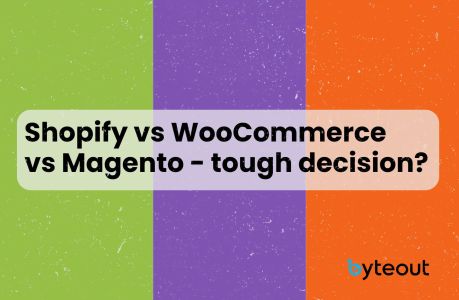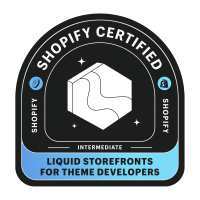
Shopify vs WooCommerce vs Magento – tough decision?
Are you considering opening an online store or switching to a different platform? Picking the right ecommerce platform is key for your business to grow. Let’s take a look at the three most popular ecommerce platforms—Shopify, WooCommerce, and Magento—to find out which one might work best for your needs.
Table of Contents
Scaling your business
When you start selling online, one key concept you should think about from the start is scaling your business. Scaling means growing your business’s capabilities and infrastructure to meet increasing demand without losing quality or customer satisfaction.
This could mean handling more transactions, offering more products, or entering new markets. Scaling is vital for your business to grow and last over time, and you probably want this for your brand, too.
Choosing the right ecommerce platform is a big decision that really impacts how well you can scale. Different platforms are better for different sizes of businesses, from small startups to large enterprises.
Shopify vs WooCommerce vs Magento and scaling
- Shopify is a number one choice for small to medium-sized businesses, providing great tools and a user-friendly environment to grow your operation. But, it also offers advanced solutions for larger enterprises through its premium tiers, which include additional functionalities designed to handle the complexities of large-scale businesses.
- WooCommerce is a flexible WordPress plugin suitable for businesses of any size. It’s particularly adaptive but does require a bit more technical knowledge as operations expand.
- Magento excels in supporting large-scale operations with its infrastructure, making it perfect for enterprises that deal with large volumes of traffic and complex ecommerce activities. However, this also makes it the least friendly solution.
Customization potential
Customization in ecommerce means making your online store fit your specific business needs, branding, and what your customers like. It’s important because it can make your store easier to use, run more smoothly, and increase sales. With customization on your shoulder, you can make your business stand out from others by offering a unique shopping experience that really shows off your brand.
Shopify vs WooCommerce vs Magento and customization
- Shopify provides a good selection of themes and apps, allowing for a decent customization level. While some may find its customization options somewhat limited, Shopify’s flexibility increases dramatically when you hire a specialized agency.
- WooCommerce excels in customization! Thanks to its integration with WordPress, users have access to extensive modifications. This platform is ideal for those who wish to have complete control over every aspect of their site, from the user interface to deep functional enhancements.
- Magento also achieves a top score for customization. It offers vast options particularly suited for those with development skills, allowing for highly specialized and intricate ecommerce solutions. This makes Magento a favorite among businesses that require complex functionalities.
Cost efficiency
When you start or run an online store, it’s really important to think about how much your ecommerce platform will cost you. This choice affects your initial investment and expenses over time. Each platform has different costs and pricing plans that can impact your budget as your business grows and changes.
Shopify vs WooCommerce vs Magento and costs
- Shopify has a straightforward subscription-based model but can become costly as you add features and grow. Include a monthly fee and count in hiring an agency if you wish to make your store special and personalized.
- WooCommerce is cost-effective. It’s free as a plugin, though you’ll need to budget for hosting and plugins.
- Magento has a great free community edition, but the enterprise version and additional costs can add up quickly.

Integration capabilities
Being able to connect your online store with different tools and systems can really boost how well it works and how efficient it is. Integration capabilities mean how well an ecommerce platform can link up and smoothly work with other software, like inventory management systems, customer relationship management (CRM) tools, and marketing platforms. Good integrations can automate tasks, give you better insights from your data, and improve your customers’ shopping experience.
Shopify vs WooCommerce vs Magento and integration
- Shopify has a well-stocked app store. Although its ecosystem has some limitations, the number of available apps means you can easily add features and connect with various external systems to make your operations better.
- WooCommerce has a deep integration within the WordPress ecosystem. This allows for a high degree of flexibility and customization through a wide range of plugins.
- Magento has a powerful API and an extensive marketplace that enables custom integrations.
Search Engine Optimization (SEO)
SEO, or Search Engine Optimization, is key for any ecommerce business because it helps people find your store online. More potential customers can discover your products when your store shows up higher in search engine results. A good SEO strategy involves optimizing your website so that search engines can easily understand what your store offers, increasing the likelihood that your products appear at the top when customers are searching for them. This can lead to more traffic, sales, and a more successful business.
Shopify vs WooCommerce vs Magento and SEO
- Shopify has strong SEO capabilities well integrated into its platform. Its built-in features support essential SEO needs.
- WooCommerce allows extensive control over SEO settings, which can greatly boost search rankings.
- Magento also has strong SEO tools that provide users extensive control over settings to enhance search rankings.
Security features
Your business has to be protected from cyber threats and build trust with your customers. Good security measures ensure that sensitive information, like credit card details and personal data, is kept safe from hackers. When customers feel confident that their information is secure, they are more likely to shop with you. Additionally, managing security effectively helps you comply with legal requirements and avoid potentially devastating data breaches and the loss of customer trust that can follow.
Shopify vs WooCommerce vs Magento and security
- Shopify excels in security with a proactive approach that includes automatic updates, secure payment gateways, and compliance with international security standards.
- WooCommerce users must actively manage their site’s security, including regular software updates, backups, and additional security measures, which can significantly burden store owners without technical support.
- Magento also requires users to manage security actively. Store owners need to stay on top of updates, manage backups, and implement extra security protocols, which demands a certain level of technical expertise.
Community and support
Having a strong community and good support can really help. These resources give you guidance, help with solving problems, and chances to learn from other sellers and experts. A supportive community can also share useful insights and tips that make it easier for you to handle the challenges of online retailing.
- Shopify excels with its 24/7 support and a very engaged community.
- WooCommerce is known for its strong, community-driven support system but the level of direct support can vary and usually includes self-help options.
- Magento also offers a strong community and excellent resources for developers, particularly for its enterprise users.
But with the right ecommerce agency on your side, you have full support for your online store.
Conclusion
Choosing between Shopify, WooCommerce, and Magento really depends on what your business needs.
Shopify is very user-friendly and works well for businesses of any size, including large companies. It provides strong support and secure, ready-to-use solutions that can grow with your business. However, it might get expensive as your business grows and you add more features.
WooCommerce is flexible and budget-friendly, ideal for those already comfortable with WordPress. It adapts well to businesses of any size but needs more active management of security features.
Magento is good for large businesses that require a lot of customization and have the technical know-how to manage it. It offers powerful tools but needs advanced technical skills to make the most of its capabilities.
All three platforms are good for SEO and offer varying levels of support and community involvement. Your decision should match your budget and business needs, making sure your online store can grow and compete effectively. Shopify is the most versatile option supporting business growth from small startups to large enterprises – and if you need assistance from a Shopify specialized agency, we can help you!

